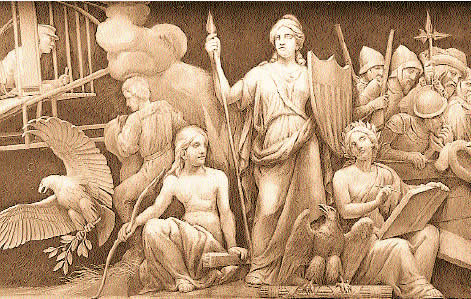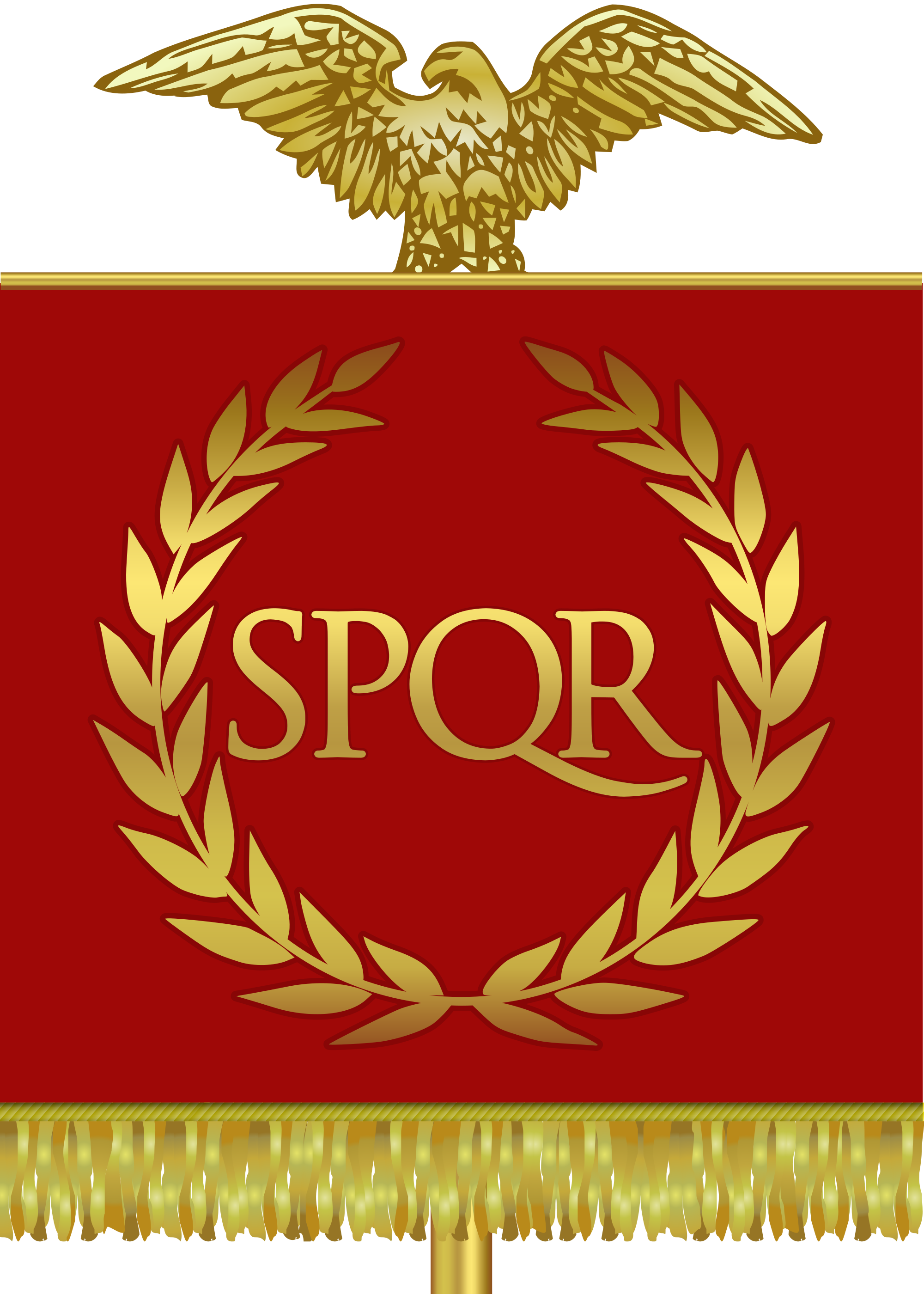“Well,
Doctor, what have we got—a Republic or a Monarchy?”
“
A Republic, if you can keep it.” The response is attributed to
BENJAMIN FRANKLIN—at the close of the Constitutional Convention of 1787, when
queried as he left Independence Hall on the final day of deliberation.” http://www.bartleby.com/73/1593.html
The
Founders were versed in their Aristotle & Montesquieu.* They
understood the classic view that a republic as a form of government was the
most fragile form, and the most subject to transition to another form after a
historically speaking short period. The transition can be sudden via
invasion and conquest. But left to its own devices a republic will slowly shift
into something else.
A
good example of the latter fate is what is considered the longest running one
in history, the Res publica Romana, i.e., the Roman Republic 509 BC - 27 BC being the standard dating. The
founders revered Res publica Romana, and drew inspiration from its governing
structures and early history.
The
fall of the that republic was not sudden. It stretches from the economic impact
of the conquest of Carthage (after 146 BC), to the Octavian victory Battle of
Philippi, October 23, 42 BC. From 146 BC to 42 BC Rome transitioned to a
plutocratic aristocracy, to an aristocracy, to a junta of sorts, eventually
resulting in an imperial monarchy in 27 BC.
Rome
is also an excellent example of how the rhetoric and symbols of a republic will
persist long after its transition. “Legislation” passed by the vestigial senate
and the acts of the emperor of the Western empire were done in the name of Senātus
Populusque Rōmānus ("The Senate and People of Rome" ) even until the capitol was sacked in the 5th
century.
So
when did the Republic Period of the United States end?
I
think it will be seen by future foreign historians, to be along the lines of a
transition from a republic to a plutocracy over a span of time from the late 19th
Century, the 1880’s perhaps to January 21, 2010.
“At the Declaration of Independence, corporations had been unlawful without explicit authorization in a Royal Charter or an Act of Parliament of the United Kingdom. Since the world's first stock market crash (the South Sea Bubble of 1720) corporations were perceived as dangerous. This was because, as the economist Adam Smith wrote in The Wealth of Nations (1776), directors managed "other people's money" and this conflict of interest meant directors were prone to "negligence and profusion".
“In
the United States, forming a corporation usually required an act of legislation
until the late 19th century. Many private firms, such as Carnegie's steel
company and Rockefeller's Standard Oil, avoided the corporate model for this
reason (as a trust). State governments began to adopt more permissive corporate
laws from the early 19th century, although these were all restrictive in
design, often with the intention of preventing corporations for gaining too
much wealth and power.” https://en.wikipedia.org/wiki/Corporation
Birth of a Persona
Louisville,
C. & C.R. Co. v. Letson, 2 How. 497, 558, 11 L.Ed. 353
(1844), “the U.S. Supreme Court held that for the purposes of the case at hand,
a corporation is "capable of being treated as a citizen of [the State
which created it], as much as a natural person."
Over
the late 19th century, more and more states allowed free incorporation of
businesses with a simple registration procedure. Stock corporations gained
limited liability in the United States by legislation in the several states in
the last quarter of the 19th century.
The
obtaining of overseas possessions (colonies) in the aftermath of the Spanish –
American War 1998 is the date used by some for the fall of the Republic. It was
seen at the time by many citizens, including most civil war veterans from both
sides, to be a dire threat to the Republic (i.e., historically, a republican
form never survives the building of an empire).
Lochner v. New York, 198 U.S. 45 (1905)
The line of Supreme Court decisions on “commercial speech” beginning with Virginia State Pharmacy Board v. Virginia Citizens Consumer Council, 425 U.S. 748 (1976). An interesting article on the subject.
Lochner v. New York, 198 U.S. 45 (1905)
The line of Supreme Court decisions on “commercial speech” beginning with Virginia State Pharmacy Board v. Virginia Citizens Consumer Council, 425 U.S. 748 (1976). An interesting article on the subject.
I
think that the completion date for the transition, can be pegged rather
exactly, on two dates.
"An imbalance between rich and poor is
the oldest and most fatal ailment of all republics."
Plutarch
The
decisions of the Supreme Court are often, in retrospect seen as a recognition
of something that coincides with something dominant in practice in the national “culture”. Examples of this include cases
such as Wickard v. Filburn, Loving v.
Virginia, Griswold v. Connecticut, etc.
An
important symbolic demotion of local control came on December 12, 2000, with
the decision in Bush v. Gore, 531
U.S. 98 (2000). In this case the court broke with a rule of judicial “economy”
and administration, going back to its earliest days. That being that in modern
times, absent allegations of discrimination, no federal court will take
jurisdiction over an election question at the state level or lower. In fact,
the court in strange ending to the majority opinion, stated, as if to preserve
precedent, “"Our consideration is limited to the present circumstances,
for the problem of equal protection in election processes generally presents
many complexities."
Second,
on January 21, 2010 defacto recognition
of the plutocracy by the government, Citizens
United v. Federal Election Commission, No. 08-205, 558 U.S. 310 (2010).
* His book was consulted and carried by the delegates to
the Constitutional Convention.
http://www.constitution.org/cm/sol-02.htm
de Secondat, Charles, Baron de Montesquieu, The Spirit of the Laws. 2 vols. Originally published anonymously. 1748; Crowder, Wark, and Payne, 1777. Spirit of the Laws Online posting. constitution.org. Trans. Thomas Nugent (1750). Rev. J. V. Prichard. ("Based on a public domain edition published in 1914 by G. Bell & Sons, Ltd., London. Rendered into HTML and text by Jon Roland of The Constitution Society.") Accessed May 16, 2007.
Excerpt:
"What is meant by a Love of the Republic in a Democracy.
A love of the republic in a democracy is a love of the democracy; as the latter is that of equality.
A love of the democracy is likewise that of frugality. Since every individual ought here to enjoy the same happiness and the same advantages, they should consequently taste the same pleasures and form the same hopes, which cannot be expected but from a general frugality.
The love of equality in a democracy limits ambition to the sole desire, to the sole happiness, of doing greater services to our country than the rest of our fellow-citizens. They cannot all render her equal services, but they all ought to serve her with equal alacrity. At our coming into the world, we contract an immense debt to our country, which we can never discharge.
Hence distinctions here arise from the principle of equality, even when it seems to be removed by signal services or superior abilities.
The love of frugality limits the desire of having to the study of procuring necessaries to our family, and superfluities to our country. Riches give a power which a citizen cannot use for himself, for then he would be no longer equal. They likewise procure pleasures which he ought not to enjoy, because these would be also repugnant to the equality.
de Secondat, Charles, Baron de Montesquieu, The Spirit of the Laws. 2 vols. Originally published anonymously. 1748; Crowder, Wark, and Payne, 1777. Spirit of the Laws Online posting. constitution.org. Trans. Thomas Nugent (1750). Rev. J. V. Prichard. ("Based on a public domain edition published in 1914 by G. Bell & Sons, Ltd., London. Rendered into HTML and text by Jon Roland of The Constitution Society.") Accessed May 16, 2007.
Excerpt:
"What is meant by a Love of the Republic in a Democracy.
A love of the republic in a democracy is a love of the democracy; as the latter is that of equality.
A love of the democracy is likewise that of frugality. Since every individual ought here to enjoy the same happiness and the same advantages, they should consequently taste the same pleasures and form the same hopes, which cannot be expected but from a general frugality.
The love of equality in a democracy limits ambition to the sole desire, to the sole happiness, of doing greater services to our country than the rest of our fellow-citizens. They cannot all render her equal services, but they all ought to serve her with equal alacrity. At our coming into the world, we contract an immense debt to our country, which we can never discharge.
Hence distinctions here arise from the principle of equality, even when it seems to be removed by signal services or superior abilities.
The love of frugality limits the desire of having to the study of procuring necessaries to our family, and superfluities to our country. Riches give a power which a citizen cannot use for himself, for then he would be no longer equal. They likewise procure pleasures which he ought not to enjoy, because these would be also repugnant to the equality.






















No comments:
Post a Comment